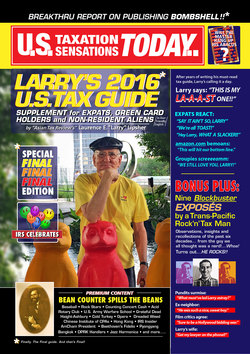Читать книгу Larry's 2016 U.S. Tax Guide 'Supplement' for U.S. Expats, Green Card Holders and Non-Resident Aliens in User Friendly English - Laurence E. 'Larry' - Страница 9
На сайте Литреса книга снята с продажи.
Scenario # 1: You are moving from the U.S. to some strange, exotic land
ОглавлениеLet us suppose….You are reading this book for the first time, while you are still in the U.S. You are soon to embark on your trip overseas, to work for the first time outside of the U.S. Perhaps you are an experienced veteran of the work force, taking your specialty overseas for an international employer who has just signed you to a multi-year contract. Or perhaps you are a young professional going into the field of law or going to work for an investment banking house or perhaps you are a teacher, going to teach at an international school. Let’s use the latter occupation, teacher, as an example for this scenario because those young bankers or lawyers will not have much time off to put their initial, qualifying year for foreign earned income exclusion in jeopardy. You, the teacher, on the other hand, are more apt to screw yourself up because of a misunderstanding of the time you must be overseas during your first year overseas – a year that begins from the date of your arrival in your new place of residence through the next 365 days. For tax year 2015 – and that means ‘calendar year’ because the IRS operates on a calendar year reporting basis - you are entitled to a maximum of $US100,800 as foreign earned income exclusion. If you are married and your spouse is working overseas, too, then each of you would be entitled to exclude a maximum of $US100,800 from taxable income. You cannot transfer any excess, ‘unused’ exclusion from one spouse to another – if two of you each earn less than $US100,800 and it is all eligible for the exclusion, then you will still have to file a tax return but you will not owe any taxes. If either or both of you have more income than the exclusion + standard or itemized deductions + tax exemptions, you are going, in essence, to be taxed at the maximum rate – and that includes all income not eligible for foreign earned income exclusion.
Tax benefits for the U.S. expat are necessary. First, the costs of living a comparable life in Hong Kong or Dubai or Singapore are at stratospheric levels compared to, say, the cost of living in Iowa. Mind you, I have absolutely nothing against Iowa - I like the place – I spent time, two summers ago, living in Iowa City while taking writing classes at the University of Iowa (and no, I am not foolhardy to think that there ever can be a ‘tax literature’ genre!)! Yet costs of life are very, very different. The average salary in mid-levels, Hong Kong, where a concentration of international expats reside is over $US 200,000 and even with that salary, life is a struggle because of the highest real estate costs and rentals in the world. Secondly, without those benefits and with the singular distinctive obligation of the U.S. expat – we seem to be the ONLY expats with an annual filing obligation - my British, German, French and Australian friends don’t have to file tax returns - they do not even think about their income, their travels, their tax consequences. Their countries do not tax upon world-wide income, just the income taxed within their territory. Heck, there are no tax consequences for them as there are for us, the U.S. expat or green card holder. If tax laws became too draconian, there would be no Americans overseas to represent U.S. products, services and industry – I like my Australian and New Zealand friends but let’s face it – they simply cannot do as good a job as Americans when it comes to representing America overseas! For the U.S. to compete on an international level, it needs its own citizenry representing the U.S.!
